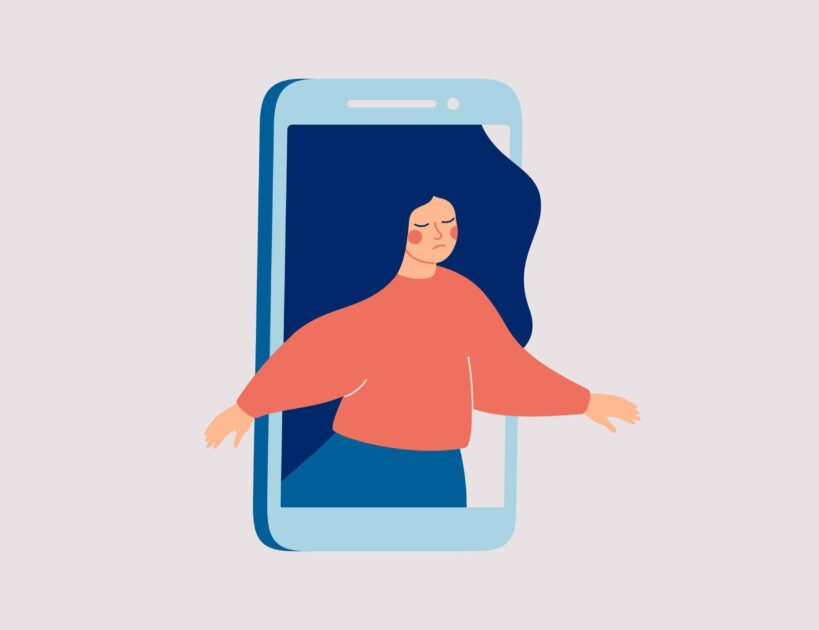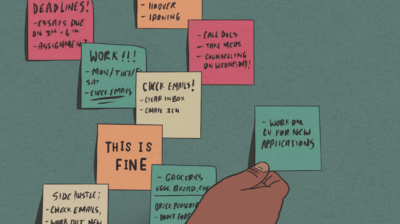How I deal with the pressure of ‘always on’ culture
Hannah talks about switching off and the importance of taking time for yourself in a world that relies on technology.

From the moment you open your eyes in the morning until you sleep at night you are ‘on’ – the state of being awake and aware of what is happening. There is a general understanding that this ends when a person goes to sleep. People often say “Shhh she’s asleep” or “I’m sorry did I wake you up coming in during the night?”. So, while this is so well respected, why does it change when it comes to being virtually ‘on’? Why are young people expected to be virtually ‘on’ 24/7?
In this digital age the separation between the real and virtual world is growing thinner and thinner. Technology has become a vital tool in life, and among the countless positives there are also harsh negatives. Children are pressured to begin creating their virtual personas younger and younger with a phone now being a pivotal part of socialising in Secondary school. Chats that would once happen outside the school gate are now happening on WhatsApp groups, leading to this pressure building from the early teenage years.
Vicious virtual cycle
When I wake up and check my phone I could have anywhere from 5 to 50 notifications from friends, group chats and apps. Most of the time it consists of irrelevant group chat messages and memes. But every so often there is a text from a friend at 3am: “Are you awake? Can you call?” and the guilt sets in… was that friend okay? What happened? Did they need me? Even though this friend didn’t mind that I was asleep, the guilt is still there.
In the meantime, my morning is spent wondering and worrying what happened to them. The guilt then circles back to them when they reply and realise that I have been worrying. This vicious cycle of guilt is one of the outcomes of the expectation of being constantly available online.
As a young person, this pressure can become overwhelming and all consuming
Although universal, this pressure can manifest in different ways and to varying degrees. There is an expectation that you will always have your phone on you unless you are scheduled to be doing something that you cannot use your phone at. There becomes a pressure to announce when you won’t be on your phone to not appear rude or absent to your friends.
Many of my friends, myself included, are guilty of beginning a reply to a text with “Sorry I wasn’t on my phone for the last few hours I was…”. This need to justify being away from your phone can be draining, feeling like you cannot have any time truly to yourself.
Fear of missing a notification
Young people are a constant target for judgement due to their ‘inability’ to put their phone down, but the matter is more complex than not wanting to miss a new Instagram post. Phones are invaluable supports in communicating, telling your parents where you are, letting your friends have access to your live location on a date and overall helping to contribute to general safety.
Using a phone as a safety feature has become so common that unfortunately the mindset has slipped into ‘if they don’t answer their phone they are in danger’. To me this is the crux of the pressure and the reason that burnout can exist so strongly in relation to being virtually ‘on’. Nobody wants their parents to worry about them or to miss a call from a friend who wants to help to leave a situation, but with this comes the fear of putting down your phone.
Rewriting the rules
Although this anxiety and fear is very real, unfortunately so is the mental strain that comes with it. Due to this there are some methods to try and reduce this feeling of needing to be virtually ‘on’ through small steps. One way would be to speak with friends and family.
You may realise that your friends feel the same way as you and together start to loosen the expectations of a fast reply. Often the pressure can work both ways in friend groups and so if you agree to stop expecting an immediate answer it could relieve stress for both sides.
Creating a compromise system could also begin to alleviate some of this stress in a controlled manner. Turning off your wifi after a certain time and telling close friends and family to call if something urgent happens after that point, for example.
If you have an iPhone there is a setting on ‘do not disturb’ which allows phone calls to ring though if the same number calls twice in three minutes. It is a compromise that can help to reduce anxiety and burnout knowing that you will not be overwhelmed by messages, but if something happens that is important you will know.
It is okay to take time for yourself
Ending this pressure is by no means an easy fix. The virtual world is growing and with online classes and working from home taking prominence during the pandemic, being virtually ‘on’ will be a big topic to debate for years to come. Already there have been laws passed in Ireland in relation to being ‘on’ virtually regarding work.
Young people over time will hopefully become the best equipped generation to handle this as they will have grown up with and learned what they need to do to handle the stress. Regardless of what leaps occur in technology, my hope is that people remember that no matter what is happening in the virtual world it is okay to take time for yourself in the real world.






